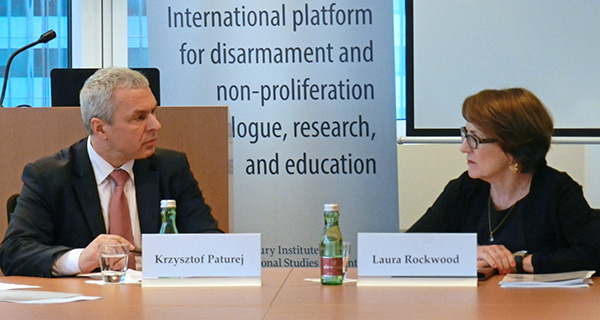
On 3 March 2016, the VCDNP hosted a seminar with Ambassador Krzysztof Paturej, Polish diplomat and President of the Board of the International Centre for Chemical Safety and Security (ICCSS), to promote a new approach to addressing chemical threats through the development of a global safety and security culture. Ambassador Paturej stressed that the global community was operating on the basis of an outdated policy with respect to the growing threat of the misuse of chemicals. International responses and regulatory mechanisms in the area of prevention, preparedness and response against the misuse of chemical, biological, radiological and nuclear (CBRN) remained weak.

The Ambassador argued that we were still thinking "through a mushroom cloud" and concentrating on weapons of mass destruction (WMD) concepts, as well as outdated methodology and terminology focused on disarmament and non-proliferation. The need to move from WMD to CBRN agents, and to focus on preparation, prevention and response to misuse of CBRN agents—rather than WMD non-proliferation, was stressed.
Ambassador Krzysztof Paturej and VCDNP Director Laura Rockwood
Referencing an important shift in terminology and methodology—introduced during the 2013 Third Special Session of the Conference of the States Parties to the Chemical Weapons Convention—Ambassador Paturej advocated replacing the emphasis on non-proliferation with "preventing the re-emergence of chemical weapons". Highlighting that there was a need to address the immediate problems of global expansion and access to chemical materials and technologies, Ambassador Paturej argued for introduction of an integrated system of chemical safety and security. Preventing the re-emergence of chemical weapons will require a global whole-society approach, in which all stakeholders—industry, government, academia, civil society—are partners in the joint efforts. National or company-specific approaches to addressing chemical security were outdated and insufficient, given the global reach of chemical production, transportation, uses and threats.
From 18 to 20 April 2016, the ICCSS will host the Global Summit on Chemical Safety and Security (CHEMSS 2016) in Kielce, Poland, "the first global multi-stakeholder event to address chemical safety and security solutions in the whole supply chain of raw materials, production, infrastructure, transportation and use of chemicals in all areas of chemical activity, with a focus on relevant industries". The Summit, and the accompanying International Chemical Safety and Security Fair (CHEM-SAFETY-EXPO), aim "to be a tipping point for national and international efforts to develop a global chemical and ecological safety and security market through internationalization and operationalization of the best existing national and international best practices, capacity building, solutions and technologies".
Emphasizing the need to move beyond political divisions and groupings, Ambassador Paturej stressed that the Summit would be a global event, "free from political exclusion". It is not a government-led initiative but rather a partnership between governments with equal stakeholders from industry, academia and civil society emerging from the grassroots level. Ambassador Paturej emphasized that the ICCSS is particularly proud of the global nature of the Summit, with participants from China, Iran, Saudi Arabia and Egypt, among others. The ICCSS has deliberately sought to avoid the use of language on non-proliferation and terrorism, where political differences and tensions may exist. By way of example, he noted that there will be no statement from the Australia Group, the export control regime that seeks to prevent proliferation of chemical (and biological) weapons, at the summit.
Ambassador Paturej underscored that CHEMSS 2016 Summit was aimed at efforts to establish a global chemical safety and security culture in order to address the global threat of the misuse of toxic chemicals. The Summit would not seek to establish new regulations or standards, but rather promote, operationalize and internationalize the existing national and international best-practices, training and technical solutions.
